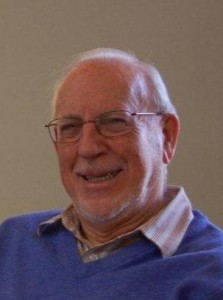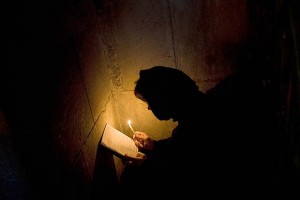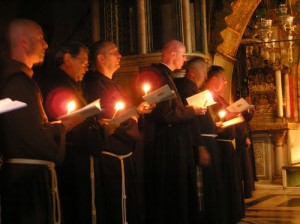The Year of Consecrated Life – Anthony F. McSweeney, SSS
CONSECRATED LIFE TODAY
Anthony F. McSweeney, SSS
(FIRST PART)
The Challenge for Humanity: a New Mentality
 Scientific mastery of the atom placed a devastating and unprecedented power in the hands of man and the horrors of Hiroshima and Nagasaki showed us once and for all not only how much destruction it can cause but also that human beings could be prepared to use this power, thereby opening up the possibility of one day destroying life itself on the planet. Albert Einstein, who knew more than others what he was talking about, launched in the name of many a heartfelt appeal for a radical change in mentality and declared: ‘The unleashed power of the atom has changed everything except our way of thinking. We are, therefore, drifting towards an unequalled catastrophe. We need therefore a substantially new way of thinking if the human race wants to survive’.
Scientific mastery of the atom placed a devastating and unprecedented power in the hands of man and the horrors of Hiroshima and Nagasaki showed us once and for all not only how much destruction it can cause but also that human beings could be prepared to use this power, thereby opening up the possibility of one day destroying life itself on the planet. Albert Einstein, who knew more than others what he was talking about, launched in the name of many a heartfelt appeal for a radical change in mentality and declared: ‘The unleashed power of the atom has changed everything except our way of thinking. We are, therefore, drifting towards an unequalled catastrophe. We need therefore a substantially new way of thinking if the human race wants to survive’.
At the present moment the greatest challenge for humanity is to engage in a leap of consciousness, to enter a new stage of evolution which is fundamentally the spiritual and moral transformation of the human consciousness.
The Need for a New Consciousness
The period of renewal obliged us as religious to rethink our lives at a deep level. Between 1956 and 1958 my Congregation published a study on the spirituality of the institute together with a commentary in three volumes on the Constitution of our Founder. In the about thousand pages of these volumes there is absolutely no reference to the lives shared by the vast majority of the men and women who live on our planet. No mention is made of daily human life and there is no reference to marriage, to the family, to children, and not even work is talked about with its cares and concerns, and the same may be said about the world of politics and the economy. The normal joys and pains, the hopes and the fears of existence, leave no trace in those volumes. The real and daily life of man seems to be distant from those pages.
A little more than ten years after the most terrible war in history and the inexpressible horrors of the Holocaust we do not find in these pages even the smallest trace of the events of human history – only the little intra-ecclesial events that directly concerned our Congregation. Even though we had recently founded communities in Africa there was no allusion in these pages to the wars of independence that were breaking out in the old colonies of that time, and we could not even know from this study that a dangerous cold war was underway at a planetary level.
Neither the yearning for peace not the struggle against injustice and oppression were allowed to disturb this rarefied and spiritual world.
The move from this very narrow and closed mentality – which marked us deeply – to the vast expansion of consciousness of today made us take gigantic steps.
The real drama of our time, for us as for everyone, is to experience a transformation of consciousness, that is to say to experience, in our immediate little world, the great sufferings ands struggles of our epoch. This assumes sharing with our contemporaries the effort to understand what is happening and to learn to align ourselves openly with the right side in the fight against the enormous evils that threaten humanity of our time.
 Religious life will have meaning for people if religious experience the fundamental human concerns of the epoch, but on the condition that they live them as a search for God, opening themselves to the transformation of minds and hearts which Christ wants to achieve in us. Is it perhaps true what Guccini says, namely that ‘people turn to us for services but look elsewhere for the meaning of life’?
Religious life will have meaning for people if religious experience the fundamental human concerns of the epoch, but on the condition that they live them as a search for God, opening themselves to the transformation of minds and hearts which Christ wants to achieve in us. Is it perhaps true what Guccini says, namely that ‘people turn to us for services but look elsewhere for the meaning of life’?
The greatest danger is that because of a lack of spiritual resources we will allow ourselves to be seduced by the little world of our immediate interests and satisfactions, our habitual ways of thinking, which are often shaped by the individualistic and subjective model of dominant post-modern culture. This is rather like remaining asleep in spiritual laziness or being satisfied with a shallow way of thinking, looking for comforts or opting for passivity, being concerned to meet our needs, giving way to consumerism and, lastly, giving undue importance to the futile aspects of social life and exploiting the gratifying benefits of an opulent society. In the end our presence will only with difficulty be differentiated within the mass given that we have become ‘just one more’. We are not only in the world – we are also of the world.
Our time needs spiritual witnesses, as Mr. Khatami, the President of Iran, said on the occasion of the funeral of John Paul II. Even if we live the ordinary commitments of our daily lives, caring for the sick, working with the poor, and serving the growth of communities, what matters is the consciousness with which we do this.
Even though separated from the century in a contemplative monastery, the true spiritual person is after a certain fashion in harmony with the deepest dynamics of the epoch, as is demonstrated by a valuable text of Thomas Merton. As early as 1950 Merton was writing these extraordinarily prophetic words: ‘We are living through the greatest revolution in history, an enormous and spontaneous agitation of the whole human race. This is not a revolution planned and carried out by a particular party, race or nation but a deep boiling of all the internal contradictions which have always been in people, a revolution of chaotic forces within each person. This is not something that we have chosen, and it is not even something that we are free to avoid’.
It is not difficult to realise that our vision of ourselves is also undergoing great changes. There is a new awareness of our involvement in the cosmos, of the fact that we are stardust in every atom of our bodies. At the same time we are challenged to reintegrate much of what has been forgotten or repressed in previous generations: for example, the body, sensuality, feelings and femininity.
A new society is struggling to be born searching for new basis for parity between the sexes and respect for all people of any race, culture or colour. This is accelerating because of the greatest migratory flows in history, the races are mixing like never before and respect for differences and liberation from prejudices cannot be put aside and are urgently needed. Conditions of work, politics and social life are undergoing an unprecedented change, like the struggle of peoples for greater democracy, to become subjects of their history. For the first time in history, the great religions of the world are beginning to dialogue with each other despite the reactionary violence of various forms of fundamentalism.
A New Birth of God in the Consciousness of Man
Post-modern man must learn to say ‘God’ in his own language and to discover the face of Christ specific to our time. Every epoch has grasped an aspect of his mystery and has generated a specific image of his face. During this period of great cultural transition that we are going through, humanity is experiencing a profound religious crisis, as it has done during similar shifts. These passages are difficult and painful, of apparent losses, but at the same time they are eras of great spiritual creativity.
 Today the world is traversed by a wave of spiritual searching. Sixty years ago, the word ‘spirituality’ was not used very much beyond the very specialised field of the history of Catholic spirituality (where more often reference was made instead to ‘ascetics and mysticism’). In recent decades, however, it has become a term that has spread very widely throughout the world.
Today the world is traversed by a wave of spiritual searching. Sixty years ago, the word ‘spirituality’ was not used very much beyond the very specialised field of the history of Catholic spirituality (where more often reference was made instead to ‘ascetics and mysticism’). In recent decades, however, it has become a term that has spread very widely throughout the world.
A surprising novelty of this search for spirituality lies in the assumption that one can develop a spirituality without religious reference points or a rooting in a Church or other religious organisation. Do we not have something say on the matter as well?
Despite the difficulties that we are experiencing in our religious institutes and the poverty of our present resources, an inalienable task of our consecrated lives remains still today, as in the past, to contribute to this search. Indeed, I would say that our present poverty rather than being an obstacle can be, in contrary fashion, a fertile field for a new religious experience.
I therefore think that we religious are called to offer our contribution to bring about the birth today of this new face of Christ, starting, however, with the current experience of poverty that we are living through rather than regretting the times of growth and successes that we may perhaps have seen as more spiritually fertile.
New Resources in a New Social Setting
To foster this change in consciousness, we must develop our capacity for a more authentic interiority. In this case the great rediscoveries associated with the Second Vatican Council are valuable aids: the retrieval of the classic sources of spirituality, above all the liturgy and Holy Scripture, and a return to the ancient traditions of prayer and contemplation, in particular practices involving the assimilation of the Word such as the Lectio Divina. The introduction of contemporary psychological cognitions also played its part, even though there was for a certain period a reductionist tendency to see spiritual health as being the same thing as psychological maturity.
I believe that three of these resources are especially important: the word of God, the Eucharist and the Founder.
We have, therefore, new resources if we want to use them. The point is whether we understand well the true nature of the challenge and whether we are led to use these sources in a new way, in dialogue and with awareness of the struggles of our time.
Here, it seems to me, is where your choice is located: thinking of your mission from the corner of justice and solidarity. Such a choice places you in what Msgr. Pierre Clavarie OP, a bishop in Algeria, called the fault lines of the reality of our time. Shortly before being killed in an attack by a group of fundamentalists he wrote as follows: ‘The Church performs her mission when she makes herself present in the fractures that crucify humanity in its flesh and its unity. Jesus died torn between heaven and earth, his arms stretched out to welcome the children of God dispersed because of sin which separates them, isolates them and makes them rise up against each other and against God Himself. He placed himself upon the fault lines born from that sin. In Algeria we are on one of these seismic lines that traverse the world: Islam/the West, the North/the South, the rich/the poor. We are truly in our place because it is precisely in this place that one can see the light of resurrection’.
The first thing, therefore, is to place oneself in the right setting – but with which mentality? ‘I believe that for us this is also a time for silence, listening, and thought. At the present time it is not important what we do (we will go on doing what we are doing) – what matters now is that we listen to what God wants of us. Such is the moment, when ‘the word of the Lord is rare’ (1 Sam 3:1), that prophets mobilised’ (Giamberto Pegoraro).
I do not agree that ‘what we do is not important’; however one notices that Pegoraro does not advise passivity, even though his words could suggest the time of ‘laying tools down’. Nor is he inviting us to become monks far from the fray. He is, rather, advising an approach. He is proposing that we find within ourselves a deep centre. He is suggesting that we give more time to discernment than to plans and programmes, and address our perplexities in the face of the troubling reality in which we find ourselves without trying to do something immediately. He is suggesting that we must take time to develop a new consciousness, and that this necessarily means going to a deep level (to be continued…)
On 22-25 January the Ecumenical Colloquium of Men and Women Religious will be held. This has been organised by the Congregation for Institutes of Consecrated Life and Societies of Apostolic Life. These three days will finish with prayers at vespers (the programme will be published in the next few days on the web site www.vatican.va at the page of the CIVCSVA). We well know the importance and also the urgent need to pray for unity. You are all invited, with your communities, to take part in the prayers of the first day (22 January at 19.00) in the Church of Jesus in Rome.














Camillians on Facebook
Camillians on Twitter
Camillians on Instagram